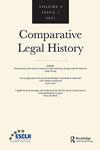What is wrong with the functionalist approach used by French scholars in studying ‘điển’?
IF 0.5
Q2 LAW
引用次数: 0
Abstract
Điển was a practice in ancient Vietnamese society that had counterparts across the Sinosphere. In the first part of this article, we study provisions on điển in ancient Vietnamese codes, together with relevant background such as Vietnamese jurisprudence and counterparts of điển. Then, we study điển in contractual practice by deconstructing legal descriptions into social behaviours to understand điển in everyday ancient Vietnamese practice and life. We argue that while ancient Vietnamese legislators did not define what điển was and what điển purported to be or to do, there was a range of uses of điển in reality, deriving from dynamic social needs and creative bargaining practice. In the second part of the article, we study French research on điển, comprising work by French academics and French-educated Vietnamese scholars. We argue that their analyses are problematic because they tried to fit điển into French paradigms despite the divergence of practice and the rich social meanings of điển. In the third part of the article, we argue that the problems with French scholarship can be understood (and thus sympathised with) in light of the need to compare across jurisdictions, with functionalism sometimes being inevitable. We call on functionalism to be reflexive and integrative to better serve comparative legal history.法国学者在研究“điển”时使用的功能主义方法有什么问题?
Điển是古代越南社会的一种做法,在整个汉语圈都有类似的做法。在本文的第一部分,我们研究了越南古代法典中关于điển的规定,并结合了越南法理学和điển对应的相关背景。然后,我们通过将法律描述解构为社会行为来研究合同实践中的điển,以理解古代越南日常实践和生活中的điển。我们认为,虽然古代越南立法者没有定义điển是什么以及điển据称是什么或要做什么,但在现实中,由于动态的社会需求和创造性的讨价还价实践,điển的使用范围很广。在文章的第二部分,我们研究了法国对điển的研究,包括法国学者和在法国受过教育的越南学者的工作。我们认为,他们的分析是有问题的,因为他们试图将điển融入法国的范式,尽管điển的实践存在分歧,而且具有丰富的社会意义。在文章的第三部分,我们认为法国学术的问题可以理解(因此同情),因为需要跨司法管辖区进行比较,功能主义有时是不可避免的。我们呼吁功能主义具有反思性和整体性,以便更好地为比较法律史服务。
本文章由计算机程序翻译,如有差异,请以英文原文为准。
求助全文
约1分钟内获得全文
求助全文
来源期刊
CiteScore
1.70
自引率
0.00%
发文量
20
期刊介绍:
Comparative Legal History is an international and comparative review of law and history. Articles will explore both ''internal'' legal history (doctrinal and disciplinary developments in the law) and ''external'' legal history (legal ideas and institutions in wider contexts). Rooted in the complexity of the various Western legal traditions worldwide, the journal will also investigate other laws and customs from around the globe. Comparisons may be either temporal or geographical and both legal and other law-like normative traditions will be considered. Scholarship on comparative and trans-national historiography, including trans-disciplinary approaches, is particularly welcome.

 求助内容:
求助内容: 应助结果提醒方式:
应助结果提醒方式:


